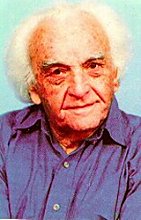
Tales from My Father's House
by Shlomo Kodesh z"l
(Reprinted with the permission of the author)
|
|
| Dr. Shlomo Kodesh, one
of Israel's foremost language educators, was generally regarded as the
prime architect or "grandfather" of the Ulpan movement, the unique
system of teaching Hebrew to the foreign-born that won the admiration of
linguists throughout the world. Born 1903 in Kupiskis, Lithuania, he died in Ashdod, Israel, in 2000 at the age of 97. He was the son of Meier-Itsko ben Movsha Kadis (b. 1861), from Pandelys, and Chana-Leah-Dvora bat Meshulim-Mordkhel Kadyshevich (b. 1861), from Kupishok. His grandfather was Movsha Kadis, the Chief Rabbi of Pandelys. In his youth, Shlomo Kodesh engaged in Zionist activities on behalf of the Jewish National Fund and Brith Ivrith Olamit. He traveled widely and visited most of the Jewish communities in Lithuania for the promotion of Zionism. Dr. Kodesh settled in Israel in 1933 and for several years served as Secretary to the Israel Court of Justice in Haifa. From 1951-1971, he was Director, Department of Hebrew Teaching and Adult Education, Ministry of Education, Jerusalem, Israel. In 1961, he was invited by the government of France to work as an expert in teaching a second language. His literary works embrace many areas including fifty books covering textbooks for children and adults, children's literature, guidebooks for teachers and a book of poetry entitled ""Zo Kupishok Shehyeta" and one of stories entitled "Beit Abba (In My Father's House)", both about Kupiskis. |
|
(Photo provided by author, 1995) |
A STORY ABOUT MENDEL LEIB RABINOWITZTold by Dr. Shlomo Kodesh, Ashdod, Israel, June 10, 1997 Taken from: "Shlomo Kodesh Tells the Stories of His Father's Home", 1995. Telling you the story about Mendel-Leib Rabinowitz demands some confession on my part - I wasn't the most diligent student in town in the realm of Talmud. It does not mean to say that I was not knowledgeable or sharp enough, but my natural curiosity constantly diverted me from matters of faith towards more secular reading. Having noticed that, my father decided to take urgent measures: first, he constructed a study room for me which was isolated from the rest of the house. But, that effort proved to be totally unsuccessful since seclusion gave me even more freedom to plunge into popular Hebrew books and magazines. Then father came up with the idea of a private tutor - he hired a shrewd Hassidic rabbi who would spend a certain number of hours with me. But those lessons also came to a halt despite the relatively high learning fees father paid for me. The poor man ouldn't stand my mischieviousness. Utterly desperate, my pious father was looking for a solution and, at last, decided quite cleverly that I would study with a partner (in Havruta). He also chose just the right kind of chap for the task: Efraim Oshri (later a Brooklyn rabbi and the author of the famous "Khurbn Lita" or "Annihilation of the Lithuanian Jews"). Miraculously enough, the new system did work and we proceeded from one Gemorah page to another and in case of problems used to turn to my father, a Talmudic scholar himself, for guidance. The only day, however, when we couldn't consult him was Thursday - the Market Day - when father gave my mother a hand at her store on the Market Square. Indeed, that day was a bit of a celebration for all shopkeepers in town, since crowds of Lithuanian peasants were flowing into Kupishok from nearby villages. So who did we go to in case of Talmudic difficulty? Mendel-Leib Rabinowitz - one of the most renowned scholars in town. However, he was also busy at his gloomy shop of agricultural instruments. I remember we once entered his store packed as elsewhere on Thursdays and watched Mendel-Leib bargain with a peasant over an instrument. They seemed to be deeply absorbed by the argument, but he asked: "And what do you want boys?" We shyly answered that we had a "kashe" (a Talmudic question). Having heard that, he left in the middle of the argument abandoning all his customers into a dark back room and invited us to follow. There we presented our question and Mendel-Leib remained with us until the issue was resolved no matter how many clients were awaiting him at the store. This is just one example of
those people's character and Mendel-Leib was one of those devoted
souls for who nothing was more important than sacred Jewish values.
|
| Copyright Kupiskis SIG, 2021 |
